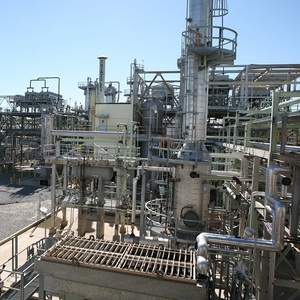REG Geismar pays off $100 million GOZone bonds ahead of maturity

Photo: Renewable Energy Group Inc.
September 7, 2016
BY Renewable Energy Group Inc.
Renewable Energy Group Inc. announced Sept. 7 the redemption in full of the $100 million Gulf Opportunity Zone bonds ahead of their 2033 maturity date. The bonds were issued by the Louisiana Public Facilities Authority to help finance construction of the company’s 75 MMgy renewable hydrocarbon diesel refinery in Geismar, Louisiana.
In connection with the redemption, the company’s subsidiary, REG Geismar LLC, prepaid all amounts owing under its loan agreement with the LPFA. The redemption was funded through a drawing on a letter of credit issued to the bond trustee that was fully collateralized with cash prior to the redemption.
“We redeemed the GOZone bonds prior to maturity with restricted cash to reduce our long-term debt and to eliminate costs associated with the bonds,” said Chad Stone, REG chief financial officer.
Advertisement
REG acquired the Geismar biorefinery in June 2014. In addition to renewable hydrocarbon diesel, the plant produces renewable naphtha and renewable LPG.
Advertisement
Related Stories
Chevron U.S.A. Inc. on May 15 filed a notice with the Iowa Workforce Development announcing plans to layoff 70 employees at its Ames, Iowa, location by June 18. The company’s Chevron REG subsidiary is headquartered in Ames.
Luxury North Dakota FBO, Overland Aviation—together with leading independent fuel supplier, Avfuel Corp.— on May 19 announced it accepted a 8,000-gallon delivery of sustainable aviation fuel (SAF) on May 12.
May 21 marks the official launch of the American Alliance for Biomanufacturing (AAB), a new coalition of industry leaders committed to advancing U.S. leadership in biomanufacturing innovation, competitiveness, and resilience.
Neste and FedEx, the world’s largest express cargo airline, have agreed on the supply of 8,800 metric tons (more than 3 million gallons) of blended Neste MY Sustainable Aviation Fuel to FedEx at Los Angeles International Airport (LAX).
The U.S. EPA on May 14 delivered two RFS rulemakings to the White House OMB, beginning the interagency review process. One rule focuses on RFS RVOs and the other focuses on a partial waiver of the 2024 cellulosic RVO.
Upcoming Events










